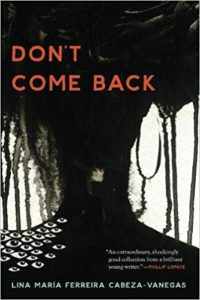Two University of Iowa Nonfiction graduates read from their recent essay collections today at Prairie Lights Bookstore.

Lina Maria Ferreira Cabeza-Vanegas is the author of Drown/Sever/Sing, winner of the 2016 Rona Jaffe Foundation Writers’ Award as well as Don’t Come Back. Her fiction, nonfiction, poetry, and translations have been featured in journals including The Bellingham Review, The Chicago Review, Fourth Genre, Poets & Writers and the Sunday Rumpus, among others.

She won the Best of the Net, the Iron Horse Review’s Discovered Voices Award, has been nominated for multiple Pushcart Prizes and is a Rona Jaffe fellow.
Cabeza-Vanegas opened the reading with a power and poignant reflection on her experience grappling with recent political injustices against her native country. This injustice inspired her to translate a poem a day for seventy-eight straight days.
Cabeza-Vanegas read a poem she recently translated called “Monday Song” written by an El Salvadorian poet. She encouraged us to reflect on our own political stances and view all countries for what they truly are.
Cabeza-Vanegas read from her essay collection Don’t Come Back, which reimagines nonfiction through a balance of evidence and transcendence. Small moments accumulate, creating lyrical and narrative harboring great emotional intensity.

Don’t Come Back, “chronicles the immigrant’s ever-present tug of family and the familiar—what is left behind—and the equally strong pull of the new land with its lure of stability and security,” said Norma E. Cantu. “Lina’s story asks readers to venture into the migrant heart’s dilemma—to go back or to stay in the new country.”
Cabeza-Vanegas used the image of a gun being pressed against one’s body that when the trigger is pulled the gun burns through one’s clothing to describe the process of writing Don’t Come Back.
“I knew a book that jumped genres, timelines, and perspectives, while utilizing diagrams, images, and untranslatable aphorisms, was the most impractical book I could write, and I thought I’d never be able to place it,” Ferreira said.
“Even though Don’t Come Back is a book from a fairly small press, and is written in a language none of my subjects speak, writing down their stories to the best of my abilities is my most sincere act of rebellion against a system that refuses to acknowledge their heroism.”
Don’t Come Back features an experimental form, meshing prose with translations, illustrations, and graphs. Cabeza-Vanegas mentioned that translation and description were, “metaphors for the same life.”
Cebeza-Vanegas weaves between, “nations, languages, and mythologies,” said E.V. De Cleyre. “The re-telling of Jorge Gaitán’s assassination in Colombia in “The Peach Orchard” is reminiscent of Elena Ferrante’s depictions of Naples. The images and graphs in “Empire of Toes” look and feel like the essays of Ander Monson or Patrick Madden. The shifting perspectives and circling of minor, and major violence read like Lidia Yuknavitch’s The Small Backs of Children.”
After six years of reporting for both national and regional newspapers, Sarah Viren enrolled in IWP. Her writing has appeared in the Oxford American, Texas Monthly, Guernica, the Iowa Review, The New Inquiry, and others. Her essay “My Murderer’s Futon” was selected by Lee Martin for The Pinch literary journal’s 2014 Nonfiction Prize.
Viren read from Mine: Essays, which was the recipient of the River Teeth Literary Nonfiction Prize. Viven said the essay collection was “ownership and the contingency of facts.”

She read an essay titled “My Wife” which grappled with the inequalities of same-sex marriage. The essay documents her experiences marrying her wife Marta in Iowa and moving to Texas where that marriage was no longer valid under federal law. The essay differentiates the ideals of life from its stark realities.




